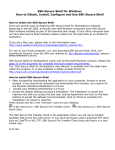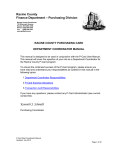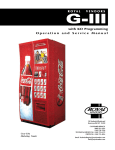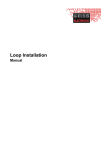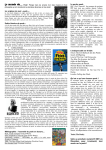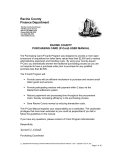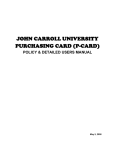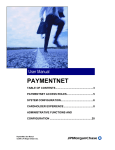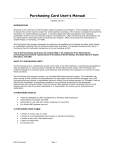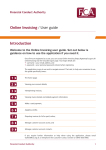Download 04-16-2015 Eastern Connecticut State University Purchasing Card
Transcript
04-16-2015 Eastern Connecticut State University Purchasing Card Procedures 1. Policy Statement 2. How it Works 3. Purchasing Card Program Overview 4. Recordkeeping/Receipt Retention and Audit Requirements 5. Responsibilities of Cardholder 6. Misusing the Purchasing Card 7. Responsibilities of Accounts Payable 8. Disputing a Transaction 9. Purchasing Card Cancellations 10. Lost or Stolen Purchasing Cards 11. Record Keeping 12. Use of P Card for Travel 13. Audits 14. Emergency Card Program 15. Use of P Card for Athletics 1. Policy Statement: The Eastern P-Card is to be used for the purchase of goods, services, and travel expenditures as defined by the State of Connecticut and Eastern Ct State University. Transaction limits are restricted to $999.00 or less per transaction with a maximum $10,000 monthly credit limit. Twenty transactions are allowed per day and one hundred transactions are allowed per month. These dollar limits are subject to changes/adjustments up to $250,000 per transaction based on clearly defined business needs, and must be approved by the office of the vice President for Finance and Administration or his/her designee. The P-Card is designed to be used strictly and solely for Eastern business-related purchases and services. Use of the card for personal purchases is prohibited and could result in the immediate and irrevocable forfeiture of the P-Card and/or disciplinary action. The Program Coordinator is responsible for monitoring the effectiveness of the Purchasing Card Program and user compliance with the procedures outlined in this policy. 2. How It Works: The purchasing card simplifies the procurement and disbursement process by facilitating point-of-demand procurement. Purchasing authority is delegated to the ordering departments enabling the authorized Cardholders to place an order directly with the suppliers. The purchasing card program provides enhanced control for all transactions by producing immediate decisions on five specific authorization criteria. 11/14 1 When a purchase authorization is requested by the vendor at the point-of-sale, the MasterCard system validates the transaction against pre-set limits established by Eastern. All transactions are approved or declined (instantaneously) based on the following purchasing card authorization criteria: (Subject to changes/adjustments based on clearly defined business needs and approved by the office of the Vice President for Finance and Administration or his designee). Number of transactions allowed per day - Twenty (20) Number of transactions allowed per month- One Hundred (100) Single purchase limit not to exceed $999.00 Spending limit per month: i. Standard card limits: ii. University Travel card holder: iii. Associate Director for Acquisitions $10,000.00 $40,000.00. (single transaction, $3,500.00) $40,000.00. (single transaction, $5,000.00) Approved commodity code- (Merchant Commodity Codes (MCC) established by the bank and encoded into the magnetic strip on the reverse side of the card.) The authorization process occurs through an electronic system that supports the purchasing card processing services under Eastern’s agreement with JP Morgan Chase. In addition, Fiscal Affairs has the capability to view a large selection of daily reports to effectively monitor the use of purchasing cards. Fiscal Affairs will also identify opportunities to further maximize Eastern’s significant buying power through contract negotiations and contract administration. 3. Purchasing Card Program Overview P-Cards are issued to employees of Eastern as designated by the Vice President for Finance and Administration. Only the Cardholder is authorized to use the card and is responsible for all purchases made. The P-Card may be used for the procurement of low value goods and services for authorized official business only and in accordance with the guidelines established by Purchasing and Contract Compliance and Travel. Purchases of restricted items listed and purchases in excess of $999.00 must continue to be processed in accordance with established procurement and travel policies. The P-Card may not be used for the following: RESTRICTED PURCHASES - 11/14 Personal purchases Alcoholic beverages Cash advances of any type 2 - Construction and renovation services Equipment over $1,000.00 (including computer hardware, CPUs, monitors and printers) Wall to wall carpet Furniture of any type, unless on-line only or emergency purchases Gifts/donations unless specifically purchased for student events using student activity funds only Insurance Personal use items (i.e.; attaches, folios, pen/pencil sets, etc.) Precious metals Capital equipment (e.g., photocopier, computer) Controlled Goods/Substances (including hazardous and radioactive materials, chemicals) Employee benefits (including entertainment, tuition and gifts) Financial instruments (e.g., money order, bank draft) Fines, late fees, penalties (including parking tickets) Internet transactions not on a secured site Special services (including independent contractors, performers, consultants, speakers) Temporary Help Gasoline for State Vehicles APPROVED PURCHASES The P-Card may be used for the following types of purchases: - 11/14 Books, periodicals, and electronic media Conference registrations (University Travel card only) Air and rail tickets (University Travel card only) Automobile rental (University Travel card only) Accommodation expenses (e.g., hotel, motel and other accommodation) (University Travel card only) Subscriptions (departmental use only) Advertisements Printing services Postage (non-metered mail up to $50.00 value) Tools, fixtures, and miscellaneous apparatus Dues and professional membership Emergencies – refer to Accounts Payable Direct Pay Policy Meals – (traveler’s) expense not to exceed per Diem. (Declining Balance cards only) Meals – (business) Internet transactions on secured site, not previously categorized above Educational/ student club supplies Equipment under $1,000.00 Software licenses Mobile phones/ipads Prizes for student events 3 4. Recordkeeping/Receipt Retention and Audit Requirements: Eastern’s agency coordinator is the liaison between Eastern, DAS, OSC, and JP Morgan Chase. The coordinator insures compliance with program and internal procedures, conducts training, identifies potential cardholders, approves application/change forms, assists cardholder(s) as needed, and completes necessary accounting documents as necessary to commit and expend funds. Each purchasing card user must keep a monthly log of all transactions and reconcile the monthly bank account statement on the JP Morgan website. Periodic audit reviews will be conducted on all card user activities. 5. Responsibilities of the Cardholder: Completing the Purchasing Card Application Form and obtaining necessary approval signature Using the card for State purchases and approved items only Ensuring at point of sale that the purchase is tax exempt. Maintaining all supporting documentation – Every transaction must be supported by a receipt Ensuring receipt of goods and following up with the vendor to resolve disputes and arranging for returns, credits, delivery problems, etc. Reporting lost or stolen card immediately. Safeguarding card security at all times. Ensuring the reconciliation of the Purchasing Card Log to the JP Morgan Chase statement. Completing the reconciliation process as required by agency procedures. (Section #11 – Recordkeeping) Notify P-Card Administrator that data is ready for review. The cardholder is responsible for repayment of improper charges and has personal liability for misuse. 6. Misusing the Purchasing Card: The Purchasing Card represents Eastern’s trust in you and your empowerment as a responsible employee of the University to safeguard and protect our assets. As a Cardholder, you assume the responsibility for the protection and proper use of the Purchasing Card. The following situations are examples of misuse of the Purchasing Card: 11/14 Use of card for personal purchases; Use of card by individual other than Cardholder; Use of the card to purchase a restricted item as identified in section 3. Splitting orders at point of sale to avoid the single transaction limit; Inappropriate re-allocation; and/or Failure to re-allocate charges within the period specified for re-allocation 4 7. Responsibilities of Accounts Payable Ensure that monthly payment to JP Morgan Chase is processed in a prompt manner. Prepare journal entry to charge appropriate expenses by index in Banner. 8. Disputing a Transaction The Cardholder is responsible for following up with a vendor regarding any erroneous charges, disputed items or returns within five (5) business days from receipt of the bank statement. A Cardholder may dispute a charge that appears on his/her monthly charge card statement. Disputed charges can result from failure to receive goods, fraud or misuse, altered charges, defective merchandise, incorrect amounts, duplicate charges, credits not processed, etc. The Cardholder should contact the vendor first to resolve any outstanding issues. Most issues can be resolved this way. If the Cardholder is unable to reach agreement with the vendor, the next step is to notify the Program Administrator with any supporting documentation for assistance. 9. Purchasing Card Cancellations: P-Cards are cancelled under the following conditions: - Employee transfer or termination. - When deemed appropriate and necessary by the Vice President for Finance and Administration. P-Card cancellations require the following action: - To cancel a P-Card, the card must be cut in half and sent to the Program Administrator along with a written request for cancellation. 10. Lost or Stolen Purchasing Cards: It is the responsibility of the Cardholder to report a lost or stolen Purchasing Card immediately. Notification must be made by phone directly to JP Morgan Chase (800) 316-6056. Bank representatives are available 24 hours a day, seven days a week. When reporting a lost or stolen card, the cardholder must tell the representative the call is regarding a purchasing card. The Cardholder must also contact the Program Administrator, Susan Kennedy (phone 4655370, email – [email protected], at the time of the occurrence. Verbal reports of lost or stolen purchasing cards must be followed in writing to the Program Administrator. 11/14 5 11. Record Keeping: Billing cycle review and approval of P-Card transactions is required at the cardholder level and appropriate documentation (log and/or requisitions) must be maintained. Every cardholder is required to review their purchasing card transactions on a monthly basis using the JPMorgan Chase’s web-based support system, Smart Data Online (SDOL). Refer to the “P-Card Program Smart Data Online (SDOL) Program Tip Sheets” in this manual’s appendix for more information on managing your P-Card activity and, by doing so, will be certifying that purchases are consistent with all University policies and procedures. Every transaction must be supported by a receipt. If a credit is issued, a receipt or some form of documentation relating to the original transaction should be provided. All supporting documentation must be secured to the billing statement to facilitate auditing. Purchases made at the end of a billing cycle may not appear until the next billing statement. Documentation for purchases that do not appear on the cardholder’s current statement must be held in a “pending” folder for timely retrieval and reconciliation of future statements. If a receipt is missing, the vendor may be able to assist the cardholder by producing a copy; or, the cardholder may request a copy of the sales draft from JPMorgan Chase. Please remember that JPMorgan Chase will charge $5 for each copy provided and retains copies for 118 days from the transaction date, after which all copies are destroyed. Requests for such copies shall be charged to the cardholder’s Banner Index. 12. Use of the P-Card for Travel: Program Overview The use of the standard P-card is prohibited for travel related expenses. The Eastern Travel Card may be used to pay expenses for employees traveling on University business, provided that an approved Travel Authorization is on file with the Accounts Payable Department. Travel expenses allowed on the Travel Card include airfare, lodging, registration, car rental, other ground transportation, and miscellaneous travel expenses. Purchases must comply with the Connecticut State University System travel policies. No personal expenses are allowed on the P-CARD at any time. Declining Balance P-Cards Declining balance cards are trip specific. They are setup to be used for Global field courses that generally run from one week to one month. Once the trip is completed, the card is closed unless the course will again be scheduled for the following academic year. Total spending 11/14 6 limits will always be variable from card to card depending upon the needs of the tour and budgetary constraints. Criteria for Use: To be utilized for ground and miscellaneous expenses for study tour events. Most hotel and airline charges will be processed through regular University payment channels. Individual P-Card restrictions for authorizations per day, daily spend, single purchase limits or transactions per billing cycle may be pre-established for each study tour card holder by the Assistant Dean of Continuing Education, or his/her designee. The card must be used only for expenses relating to the trip. Card users must take into consideration currency conversion and rate conversion fees on all foreign expenditures to prevent exceeding total spend limit. Traveler Responsibilities It is the traveler’s responsibility to ensure that all travel expenses are reasonable, necessary and in accordance with CSUS Travel policy. The CSUS Travel policy requires approval via a TA form prior to travel. Issuance of a TA Number by the Eastern Accounts Payable Department indicates approval and acceptance of the travel request and signals to the requestor that appropriate travel arrangements may begin. Reference CSUS Travel Policy at http://www.easternct.edu/depts/fiscal/TravelPoliciesProcedures.htm Meals and the P-Card Meals while on authorized University travel are allowed on the Eastern P-Card as referred to in Section 3. 13. AUDITS Periodic audits will be made to cardholder accounts to ensure compliance with established procedures for card use: Use of card to purchase restricted item. Splitting orders at point of sale to avoid single transaction limit. Sales tax not exempted. Use of card for personal purchases. Use of card by any individual other than the cardholder. Consequences of misuse will include any one, or a combination of the following remedial actions: 11/14 Temporary suspension of cardholder privileges. 7 Card suspension with permanent loss of privileges. Disciplinary action up to personal liability and repayment. 14. Emergency P-Card Program The State of Connecticut has implemented an Emergency Purchasing Card Program that is part of the current Purchasing Card Program administered by the Office of the State Comptroller and Department of Administrative Services. The purpose of the Emergency Purchase Card is to have a purchasing mechanism in place that is activated by a State of Emergency. CONDITIONS OF USE: The Eastern Purchasing Card may be used for emergency purchases in the event of a State of Emergency declared by the Governor and if no action to disapprove has been taken by the General Assembly (CGS Sec 28-9). EMERGENCY CARDHOLDER/S: The Emergency cardholder, Vice President of Finance and Administration, will have transaction limits raised and be responsible for placing orders and maintaining receipts. The Agency Purchasing Card Coordinator will be responsible for maintaining the documentation. 15. Use of the P Card by Athletics Standard P Cards have been issued to coaches for the purchase of meals and miscellaneous expenses while on team travel events. They are not to be used for purchasing airfare, lodging, or vehicle rentals with the exception of: Weather Emergencies, or other catastrophic events preventing return flights. Tournament play/play-offs requiring extra day stays at the play-off venue. JP Morgan, in conjunction with Eastern CT State University will engage the “Stranded Traveler Policy. In order to be classified as a Stranded Traveler, the cardholder must be on travel, unable to adhere to previously arranged accommodations and/or flights based on the exceptions above. At that time, the card user must call the Customer Service number on the back of the card, and explain the circumstances. 11/14 8 Examples: Extended stay at Hotel (cost per day) for play-offs. Car Rental if a change in venue Meals Rescheduled Transportation: canceled flights or extended dates. If the call is received During Business Hours (M-F 8am-5pm in company time zone), JP Morgan’s Customer Service will transfer to the Program Administrator, Susan Kennedy. If the PA is not available, a message will be left, and the account managed to allow for legitimate charges. If the call is received after hours, Customer Service will manage the account, to allow for legitimate charges. 11/14 9 APPENDIX SMART DATA ONLINE (SDOL) PROGRAM TIP SHEET This tip sheet is provided to give you direction on accessing Smart Data Online, JPMorgan Chase’s online program for Eastern Connecticut State University’s P-card. LOGGING INTO SMART DATA ONLINE FOR THE FIRST TIME These are the steps you will follow to log into Smart Data Online (SDOL): 1. 11/14 Access the Smart Data login page: To begin the process, launch your Internet browser and enter the following address: https://sdg2.mastercard.com/sdportal/home.view. The login screen looks like this: FOR YOUR FIRST LOGIN/SELF REGISTRATION: Tab through the User ID and Password fields, and click on the “Cardholder Self-Registration” link. Enter your P-card’s sixteen-digit account number as your login ID. Do not include any dashes or spaces. Enter Eastern’s Registration number 387487. 10 Click “Next” and continue to next screen in order to complete your profile and password information. Select a new password that will be easy for you to remember, but difficult for others to guess. The SDOL password requirements are as follows: 8-20 characters long; two of which must be numeric Case sensitive Cannot contain spaces Cannot be reused Cannot be the same as your User ID 11/14 11 SMART DATA ONLINE HOMEPAGE From the SDOL homepage, you can view your company information, read important news about the system, link to other resources, or download scheduled reports and exports from your Inbox. When you’re logged into the SDOL program, your regular Internet browser (i.e. Internet Explorer) buttons are hidden. The SDOL program has an online help system that you can click on to provide assistance throughout the program. The SDOL system home page looks like this: 11/14 12 SMART DATA ONLINE TRAINING TUTORIAL After you login to SDOL, you should complete the JPMorgan Chase Training Tool, to familiarize yourself with the SDOL application. The training tool link is located in the “Resources Center” section of the SDOL home page. Select the “Web Tutorial” training link and follow the prompts through the training. The online training tool will take you through an introduction to the program and getting started (logging on to SDOL and the homepage). The training tool also will navigate you through financial transactions and reporting options. The training tool will take approximately one hour to complete. CARDHOLDER RECORD KEEPING RESPONSIBILITIES The monthly billing cycle for the P-card program is from the 26th day of the month to the 25th day of the next month. Each cardholder is responsible for reviewing their transactions not more than 10 business days following the end of the billing cycle. To verify charges: Under Account Activity, click on Transaction summary 11/14 13 Search by Date Range involving either the charge’s posting date or transaction dates (see screen shot below). Select “Search” to view transactions for the period selected. 11/14 14 Transaction summary: “Expand All’ to view all charges. You may enter accounting information from this view, or Click on the arrow > for Accounting Detail 11/14 15 The following must occur for each transaction: a) Complete a brief “Expense Description” for the transaction. Some examples may include listing the specific purpose for the item (i.e. TA # for Travel; Candidate search for refreshment, etc.) b) Open the “Account Codes” and select the appropriate Account code for the purchase from the drop down menu. c) Click on the under the INDEX field, type “ACCO01”, and click on the Index. d) “SAVE” after each entry. e) A receipt must be matched to each transaction. Select the “Receipt” check box. If for some reason the receipt is missing, you as the cardholder are responsible for acquiring a copy of the receipt and keeping it with a copy of the billing statement for audit purposes. f) Once you have verified the transaction, select “Cardholder Reviewed and Approved.” 11/14 16 To Split Transaction Amounts with other Indexes, Click on middle icon. 7/2014 17 Click on “Add” to select the number of splits. Type in Description and Amounts to Split – Click Save Click on → to Enter the Index and Account Save after each Entry. 7/2014 18 To Run Your Monthly Report: 1. On the Home page click on Total Transactions. 7/2014 19 2. Select the appropriate Billing Cycle for that report (You may also run the report by Date Range involving either the charge's posting date or transaction date.) 7/2014 20 3. Click on Account Activity and select Schedule Report. 7/2014 21 4. Select "Accounting Code Detail Report". 7/2014 22 5. Select “EASTERN CT STATE UNIVERISTY” (Active) and click NEXT. 7/2014 23 6. Schedule Report Filters: Select “NEXT”. 7/2014 24 7. Schedule Report Options: 7/2014 Under Date type, select “Posting Date”. Delivery Options, “System Inbox”. Report Format choose Adobe PDF or Excel. Number Format: xx,xxx,xx Date format: MM/DD/YYYY If there are any splits, click “Include splits”. Fill in the description (required). Notify me at: (your email address) Click “Next”. 25 8. Schedule Report Frequency: 7/2014 Choose the date range and the frequency desired. Click “SAVE”, and Exit JP Morgan. 26 An email will be sent to you when the Report is ready. Log-In to the JP Morgan Website from the email. 7/2014 27 On the Home Page “click” on Completed Reports. 7/2014 28 Click on the Accounting Coding Detail to download the report. 7/2014 29 Click Download 7/2014 30 NOTE: Be certain that POP UP’s are not being blocked! If they are, you will need to unblock the pop up’s and restart the report. 9. Print the Accounting Code Detail Report, attach all associated receipts, and monthly log. The log must be signed by the card user and his/her direct Supervisor. This information will be necessary for the P-Card Program Team to perform their audit of the cardholder’s account. NOTE: Improper record keeping is a violation of the responsibilities of the cardholder and is subject to removal of the P-card. Please refer to Misuse of the P-card in the Purchasing Card Program Policy and Procedures manual for more information. OTHER INFORMATION If you have any questions, please contact the Program Administrator: Susan Kennedy P-Card Administrator [email protected] 7/2014 Telephone: 860/465-5370 Fax: 860/465-5353 31 EASTERN CONNECTICUT STATE UNIVERSITY Purchasing Card Agreement Form Eastern Connecticut State University presents to you a MasterCard Purchasing Card. This card represents the University's trust in you and our willingness to empower you as a responsible employee of the University and our belief in your ability to safeguard and protect our assets. I, , hereby acknowledge receipt of a Eastern Connecticut State University Purchasing Card. As the holder of this Purchasing Card, I understand and accept the responsibility for the proper use and protection of same as outlined in this agreement and I have read, understand and agree to the terms in the Purchasing Card (P-Card) Program Policy and Procedures Manual (herein “User Manual”). I agree to use this card for official University purchases only, and understand that all my purchases will be consistent with all University policies and procedures. I will not use it for personal purchases of any kind nor will I loan my card to other individuals. University purchases may include authorized travel and general purchases. Additionally, I agree to maintain proper supporting documentation for appropriate travel related expenses or general purchases. Within 10 days following the receipt of the monthly statement, I agree to review my current period charges utilizing the J.P. Morgan Chase credit card statement process. I agree to reconcile my transactions and attach all necessary documentation to a printed copy of the statement and maintain such documentation on file until authorization to dispose of such information is granted by Fiscal Affairs. Furthermore, I will resolve any issues regarding my statement and will ensure that the statement amount agrees with my documentation. I will maintain my records in a manner that allows for timely retrieval by internal/external auditors. When using the card for general purchases, I agree to purchase only approved purchases as identified in the User Manual and will utilize University and State contract vendors whenever possible. When using the card for travel, I agree to follow Connecticut State University travel policies, and I also agree to use the card only for approved travel expense. I understand that use of this Purchasing Card for purchases deemed inappropriate may result in disciplinary action, up to and including dismissal, personal liability for improper charges, and loss of my cardholder privileges. I acknowledge that I will be responsible for the re-payment of any charges deemed inappropriate by direct reimbursement and/or payroll deduction based upon official notification of such. This responsibility may continue beyond termination of employment and may include any associated legal fees. I understand that Eastern Connecticut State University may terminate my right to use this credit card at any time for any reason. I agree to return the credit card to the P-Card Administrator immediately upon request or upon termination of employment. Cardholder Signature: Date: 7/2014 32 cc: Cardholder’s Personnel File EASTERN CONNECTICUT STATE UNIVERSITY Purchasing Card Documentation Form or Missing Receipt Form This form may be used for phone orders or when a receipt has been misplaced. Complete Sections 1-6 for a phone order Complete Sections 1-7 for a missing receipt (1) Vendor: (2) Date of Purchase: (3) Purchase Amount: (4) How Ordered: [Check One] Phone Mail Internet Fax in Person (5) Description of Purchase: [List items purchased]: Attach second page if additional space is required. (6) Justification: [Purpose] (7) As cardholder, I certify that the above purchase was made for Cardholder’s Name [Please Print] Official University business and this form is being submitted in lieu of the receipt. Signature Date Note: Repeated use of this form in place of a missing receipt will result in temporary suspension of your Purchasing Card. 7/2014 33 7/2014 34


































